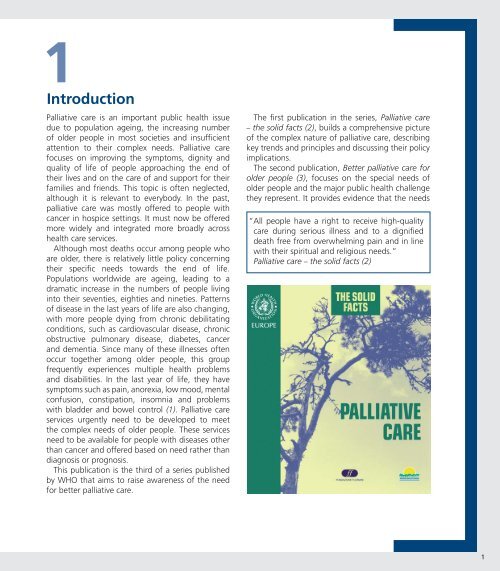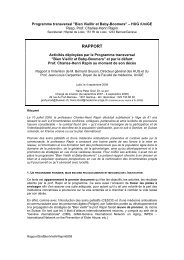Palliative care for older people - World Health Organization ...
Palliative care for older people - World Health Organization ...
Palliative care for older people - World Health Organization ...
You also want an ePaper? Increase the reach of your titles
YUMPU automatically turns print PDFs into web optimized ePapers that Google loves.
1Introduction<strong>Palliative</strong> <strong>care</strong> is an important public health issuedue to population ageing, the increasing numberof <strong>older</strong> <strong>people</strong> in most societies and insufficientattention to their complex needs. <strong>Palliative</strong> <strong>care</strong>focuses on improving the symptoms, dignity andquality of life of <strong>people</strong> approaching the end oftheir lives and on the <strong>care</strong> of and support <strong>for</strong> theirfamilies and friends. This topic is often neglected,although it is relevant to everybody. In the past,palliative <strong>care</strong> was mostly offered to <strong>people</strong> withcancer in hospice settings. It must now be offeredmore widely and integrated more broadly acrosshealth <strong>care</strong> services.Although most deaths occur among <strong>people</strong> whoare <strong>older</strong>, there is relatively little policy concerningtheir specific needs towards the end of life.Populations worldwide are ageing, leading to adramatic increase in the numbers of <strong>people</strong> livinginto their seventies, eighties and nineties. Patternsof disease in the last years of life are also changing,with more <strong>people</strong> dying from chronic debilitatingconditions, such as cardiovascular disease, chronicobstructive pulmonary disease, diabetes, cancerand dementia. Since many of these illnesses oftenoccur together among <strong>older</strong> <strong>people</strong>, this groupfrequently experiences multiple health problemsand disabilities. In the last year of life, they havesymptoms such as pain, anorexia, low mood, mentalconfusion, constipation, insomnia and problemswith bladder and bowel control (1). <strong>Palliative</strong> <strong>care</strong>services urgently need to be developed to meetthe complex needs of <strong>older</strong> <strong>people</strong>. These servicesneed to be available <strong>for</strong> <strong>people</strong> with diseases otherthan cancer and offered based on need rather thandiagnosis or prognosis.This publication is the third of a series publishedby WHO that aims to raise awareness of the need<strong>for</strong> better palliative <strong>care</strong>.The first publication in the series, <strong>Palliative</strong> <strong>care</strong>– the solid facts (2), builds a comprehensive pictureof the complex nature of palliative <strong>care</strong>, describingkey trends and principles and discussing their policyimplications.The second publication, Better palliative <strong>care</strong> <strong>for</strong><strong>older</strong> <strong>people</strong> (3), focuses on the special needs of<strong>older</strong> <strong>people</strong> and the major public health challengethey represent. It provides evidence that the needs“All <strong>people</strong> have a right to receive high-quality<strong>care</strong> during serious illness and to a dignifieddeath free from overwhelming pain and in linewith their spiritual and religious needs.”<strong>Palliative</strong> <strong>care</strong> – the solid facts (2)1
















